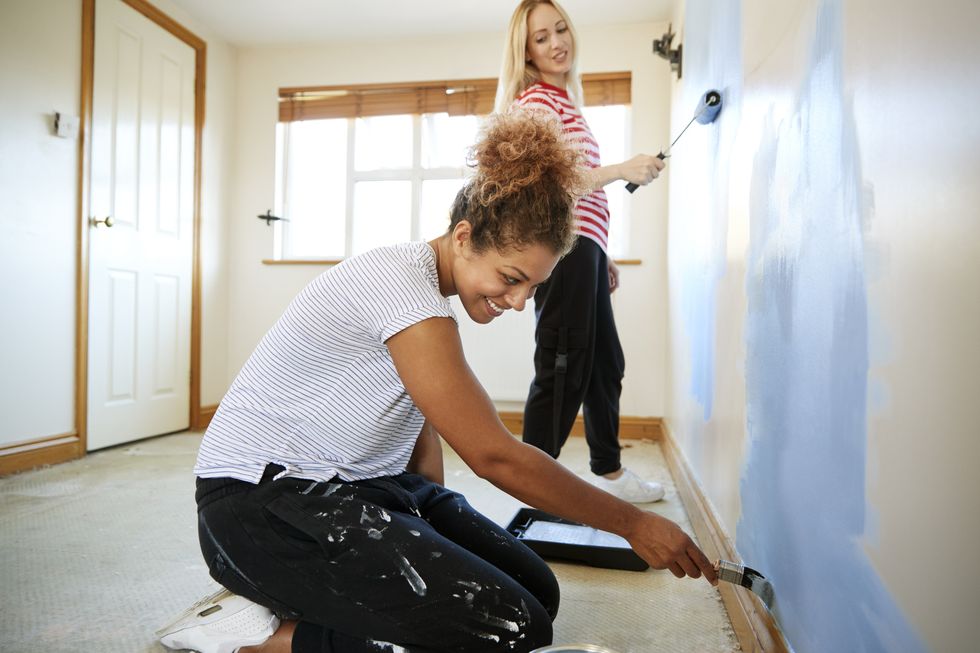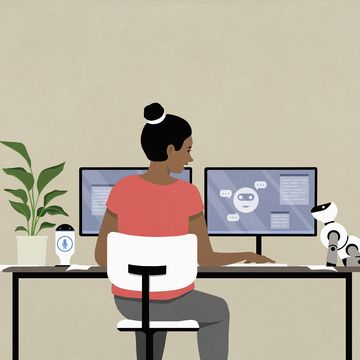Skyrocketing rents in many areas of the country mean owning a property is an increasingly attractive option for first time buyers. New research from Rightmove shows it’s cheaper to pay a monthly mortgage on the kind of home a first-time buyer might buy than rent in half of the cities of Great Britain, despite a new national record first-time buyer asking price and higher mortgage rates.
"It highlights how frenetic the rental market has been for a long time now, with many areas continuing to see record rents and fierce competition between tenants for the properties available," says Rightmove’s property expert Tim Bannister. "It helps to explain why we’re seeing such determination from first-time buyers to continue to get onto the ladder despite the economic headwinds that they face, and why we’re seeing buyers increasingly return to cities while a bigger proportion of renters are looking to move away,” he says.
You might think the news that house prices are continuing to fall would be good for those wanting to get on the property ladder, but it's still a huge challenge. A typical first-time buyer home now costs a record £226,399, and the best-buy rate on a five-year fixed, 90% LTV mortgage at 4.45%, according to Rightmove.
So, for the determined, how do you go about raising a deposit and finding an affordable mortgage? Here’s everything you need to get you started.
Where should I start and how can I find a mortgage calculator?
The first thing you need to figure out is how much you need to save for a deposit, what house price you can afford (keeping in mind the mortgage you'll need) and roughly what timeframe you want to give yourself to achieve this by.
A good way to find out this information is through online widgets, such as the mortgage calculators offered by sites like MoneyHelper and MoneySuperMarket. These will look at your income and monthly household costs to calculate what you can afford and what kind of mortgage you could get.
"If your buying power has been affected by higher mortgage rates, it could be worth considering buying a smaller property as your first step on the ladder, or broadening your search and purchasing in a cheaper area," says Zoopla's consumer expert, Dan Copley.
If you'd like more great money reads, SIGN UP HERE for our fortnightly Financially Fabulous newsletter!
How can I save for a deposit?
Once you know how much you need to save, make your money work harder for you by choosing an option that will maximise your assets.
*A Lifetime individual savings account (or LISA) can be used towards a deposit on a first home or towards a pension. This type of ISA is available to anyone aged 18 to 39, is tax-free and allows you to save up to £4,000 each year – the government adds 25% to whatever you save. This means if you put in the maximum amount yearly, the government will add £1,000 to your account. But if the money is withdrawn for any other reason, there is a 25% penalty charge.
Watch out if you are buying in an expensive area. The maximum eligible property value for which you can use your LISA hasn't been increased from the £450,000 limit since it was launched six years ago and is now lagging behind the increase in property values. MoneySavingExpert is calling on the government to raise the limit and index-link it to house prices going forward.
*Stamp duty exemption: First time buyers do not have to pay any stamp duty on homes worth up to £425k in England and Northern Ireland. The rates vary in Scotland and Wales – use the HomeOwnersAlliance stamp duty calculator to find out what you’d have to budget for.
What if I need my parents help to buy?
There are a number of guarantor mortgages available for this scenario, where a parent or grandparent promises to cover the mortgage repayments if the home buyer fails to pay. Brian Murphy, head of lending at the Mortgage Advice Bureau explains how it works: "You are guaranteeing that you can make the repayments on the borrower’s mortgage, should you need to. You will be named on the mortgage, but you won’t own a share of the property, nor will your name be on the deeds. You’re purely responsible for making the repayments, should the borrower fall behind. For this reason, people tend to be guarantors only to those they know really well, and are usually parents or a close family member."
You can also use your savings to offset against the mortgage. "You’ll have a savings account that is essentially provided by the mortgage lender," says Brian. "Depending on the terms of the mortgage, there will be restrictions on when and how much money you can withdraw from the account until a certain amount of the mortgage has been paid off or the level of equity has increased beyond a specific loan to value.”
For instance, the Barclays Family Springboard mortgage uses your family or friends' savings to get your own no-deposit mortgage and pay them back with interest. Tipton’s Family Assist Mortgage allows the first-time buyer to borrow 100% of the purchase price or property value (whichever is lower). In place of a deposit, a relative will need to secure 20% of the total amount borrowed against their own property, or put 20% or the total amount borrowed into the Family Assist account.
Seek independent financial advice before making a decision. You can find an FCA-regulated financial advisor at Unbiased or Vouchedfor.
Other options
*Skipton Building Society recently launched a 100% Track Record mortgage that doesn't require a guarantor. Renters struggling to save for a deposit can now access this five-year fixed mortgage without having savings to put down towards a deposit. You will only be able to borrow the equivalent or less of what you pay in rent each month. So how much property this will buy you (if any at all) will depend on where you live. The mortgage comes with an interest of 5.49%, so is a little more expensive than the typical five-year fix — currently around 5%. You will need to be a first-time buyer, be at least 21 years old, have paid your rent in full and on time for a minimum of 12 months, and have a good credit history. Use the calculator on the Skipton Building Society website to work out the maximum you could borrow based on your average rental payments.
"There are many stories at the moment about the recent reintroduction of 100% mortgages. But the reality is that 95% of first time buyers have at least a 5% deposit as these sorts of products are few and far between. Focus on what you can save to secure yourself more affordable repayments further down the line," says Dan Copley, "and don't forget to account for extra buying costs – aside from your deposit, solicitor’s fees, mortgage fees, stamp duty and other costs can all add up when buying a home."
*Leeds Building Society, in partnership with Experian Boost, has just launched a new scheme that takes into account a borrower’s good financial track record when carrying out mortgage checks. This means the last 12 months’ of regular debit payments, such as your council tax and subscriptions to digital entertainment services like Netflix or Spotify, can now contribute to your credit scores and be factored into mortgage applications to Leeds. The new scheme is available on single application mortgages only at present but the building society plans to roll it out to joint applicants soon.
What help is available for first time buyers?
There are government schemes available to make first-time home ownership more affordable. Paula Higgins, CEO of the Home Owners Alliance gives us a round-up of the current options available: “It's a confusing picture for first time buyers to understand what government support is out there. The government's flagship Help to Buy programme is now closed but there are rumours of a new scheme launching closer to the election.
“In the meantime, there is help out there for those aspiring homeowners. The mortgage guarantee scheme has been extended to the end of 2023 and is designed to help buyers with a 5% deposit to buy a home. Shared ownership, where you buy a portion and pay rent on the rest is also an option for those on lower incomes who would not be able to purchase a home on the open market.
“In 2021, the government announced a First Homes programme offering a 30% discount on new homes for eligible first time buyers. Promising up to 1500 new homes by the summer 2023, the programme has spectacularly failed to meet its ambition," says Paula.
What if I want to buy a house with my partner?
As part of your planning process, you’ll need to factor in whether you’re buying on your own or with a partner or parent. Buying with a partner is obviously a huge commitment.
*If you’re moving in with your partner but are not married, and you’re putting in different amounts of money, experts tend to recommend buying as ‘tenants in common’. Owning the property as tenants in common means, in the event that you later go your separate ways, the sale proceeds would be divided according to each party’s respective share.
*Get a Declaration of Trust (or Deed of Trust) drawn up. This is a is a legally-binding document recording the financial arrangements between joint property owners, including what share of the property each owns and what should happen in various eventualities. While there are templates for drawing this up on your own, it’s highly advisable to use a solicitor as this is a legally-binding document.
*Setting up a ‘cohabitation' or living together agreement’ is also a good idea – this can cover other financial matters as well as your property and will outline what will happen should the relationship end. Ben Evans, lead solicitor in family law at Co-op Legal Services says: “This can help by setting out how a couple wish their financial matters to be dealt with upon separation and how any children should be provided for.
"Such agreements can give reassurance to all parties that the potential of a bitter dispute has been avoided by some simple thought and planning given at the outset of the relationship," he says. "If you were to still end up in court, the Judge will take into account the co-habitation agreement, as it clearly sets out your wishes in writing."
Bookmark these:
- Check out MoneySavingExpert’s guidance on the mortgage guarantee scheme
- Check out the government website for details on the Shared ownership and First Homes Scheme
- Use MoneyHelper’s stamp duty calculator
- Find a mortgage broker via Vouchedfor and Unbiased.
- The HomeownersAlliance has a wealth of information for first time buyers.















